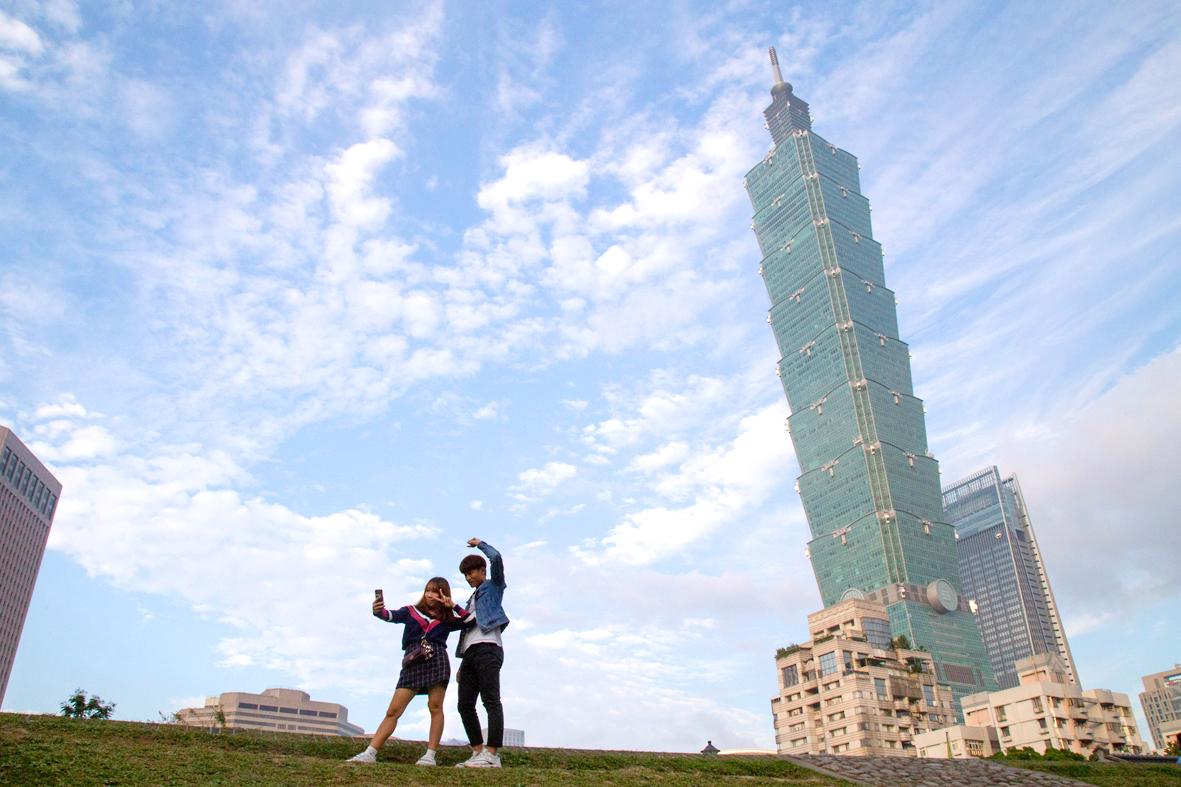Taipei 101, one of the nation’s leading shopping centers, is planning to reduce its business hours due to decreased demand amid the COVID-19 pandemic.
Taipei 101 is to open daily at noon and close at 9pm from April 6, building management said in a statement on Monday.
The shopping center has been opening at 11am and closing at 9:30pm from Sunday to Thursday, while closing at 10pm on Friday and Saturday.

Photo: Bloomberg
The restaurants in the food court — on the basement level — would adjust their business hours as necessary, but the supermarket would continue to open at 9am daily, management said.
The shopping mall is the nation’s first to cut back operations due to the pandemic, which has heavily affected business in Taipei’s Xinyi District (信義).
Taipei 101 has since February implemented measures to prevent the spread of the coronavirus, such as checking the temperature of shoppers and denying entry to those with a reading of 37.5°C or higher.
Management said that it has improved the building’s ventilation system and more frequently disinfects elevators, escalators and restrooms.
The new business hours would allow mall enterprises and brand stores to spread out employee shifts to lower the risk of COVID-19 infection, management said.
Meanwhile, other major shopping centers, such as the Far Eastern Sogo Department Store (遠東Sogo百貨) chain, the Shin Kong Mitsukoshi Department Store (新光三越百貨) chain and the Breeze Group (微風集團), said that they have no plans to reduce their business hours.
Separately, 17 Michelin-starred restaurants in Taipei that earlier this year were found to have breached sanitary regulations have all passed a second inspection, the city’s Department of Health said on Monday.
The department inspected 51 Michelin-starred restaurants in Taipei from January to March, and found that 17 of the restaurants had contravened sanitary regulations, the department said in a statement.
Inspectors found dirty equipment or ingredients on the floor, while some restaurants failed to provide the results of employee health examinations, the department said.
A second inspection showed that the offending conditions had been corrected, it said.
The restaurants with offenses were Golden Formosa (金蓬萊遵古台菜), The Restaurant (三二行館), Indulge Bistro (實驗創新餐酒館), Leputing (樂埔町), RAW, Nihonryori RyuGin (祥雲龍吟), Le Palais (頤宮中餐廳), Chi Chia Chuang (雞家莊), Tainan Tan Tsu Mien Seafood Restaurant (台南擔仔麵海鮮餐廳), Sushi Ryu (隆鮨), JE Kitchen, Sushi Amamoto (鮨天本), Shing Peng Lai (興蓬萊), Tairroir (態芮), Tien Yuan Seafood (田園海鮮), Yu Kapo (彧割烹) and Peng Lai (蓬萊), the statement said.

Intel Corp chief executive officer Lip-Bu Tan (陳立武) is expected to meet with Taiwanese suppliers next month in conjunction with the opening of the Computex Taipei trade show, supply chain sources said on Monday. The visit, the first for Tan to Taiwan since assuming his new post last month, would be aimed at enhancing Intel’s ties with suppliers in Taiwan as he attempts to help turn around the struggling US chipmaker, the sources said. Tan is to hold a banquet to celebrate Intel’s 40-year presence in Taiwan before Computex opens on May 20 and invite dozens of Taiwanese suppliers to exchange views

Application-specific integrated circuit designer Faraday Technology Corp (智原) yesterday said that although revenue this quarter would decline 30 percent from last quarter, it retained its full-year forecast of revenue growth of 100 percent. The company attributed the quarterly drop to a slowdown in customers’ production of chips using Faraday’s advanced packaging technology. The company is still confident about its revenue growth this year, given its strong “design-win” — or the projects it won to help customers design their chips, Faraday president Steve Wang (王國雍) told an online earnings conference. “The design-win this year is better than we expected. We believe we will win

Chizuko Kimura has become the first female sushi chef in the world to win a Michelin star, fulfilling a promise she made to her dying husband to continue his legacy. The 54-year-old Japanese chef regained the Michelin star her late husband, Shunei Kimura, won three years ago for their Sushi Shunei restaurant in Paris. For Shunei Kimura, the star was a dream come true. However, the joy was short-lived. He died from cancer just three months later in June 2022. He was 65. The following year, the restaurant in the heart of Montmartre lost its star rating. Chizuko Kimura insisted that the new star is still down

While China’s leaders use their economic and political might to fight US President Donald Trump’s trade war “to the end,” its army of social media soldiers are embarking on a more humorous campaign online. Trump’s tariff blitz has seen Washington and Beijing impose eye-watering duties on imports from the other, fanning a standoff between the economic superpowers that has sparked global recession fears and sent markets into a tailspin. Trump says his policy is a response to years of being “ripped off” by other countries and aims to bring manufacturing to the US, forcing companies to employ US workers. However, China’s online warriors